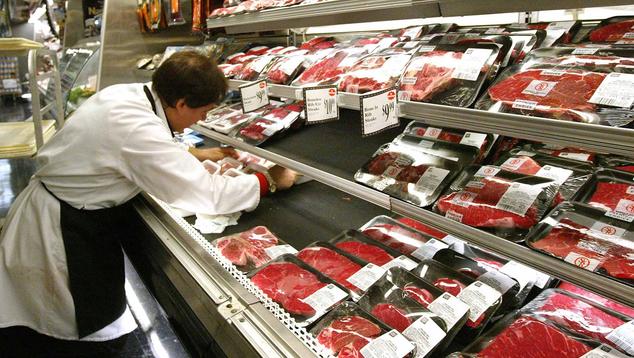WASHINGTON, D.C. -- Americans’ confidence in the federal government’s ability to ensure the safety of the U.S. food supply has reached a record low in Gallup’s trend dating back to 1999. The 57% of U.S. adults who now say they have a “great deal” or “fair amount” of confidence in the government to keep the food supply safe is down 11 percentage points from Gallup’s prior reading in 2019.
Roughly eight in 10 Americans expressed faith in the government to ensure food safety in Gallup measures from 1999 to 2006. After a massive salmonella outbreak in 2007, about seven in 10 remained confident. Americans’ confidence stayed near that level in 2008 and 2019 before dropping this year.
These data were collected as part of Gallup’s annual Consumption Habits poll, conducted July 1-21.
While 57% express at least a fair amount of confidence in the government to keep food safe, 28% of Americans do not have much confidence and 14% have “none at all.”
Among partisans, Republicans’ confidence has dropped the most since 2019, which could largely reflect the party of the incumbent president then (Republican Donald Trump) versus now (Democrat Joe Biden). Fifty percent of Republicans currently say they have a great deal or fair amount of faith in the government’s assurance of food safety, a 27-point decrease from 2019.
Confidence is also down among political independents by 11 points, from 63% in 2019 to 52% today.
Conversely, more Democrats now (74%) than in 2019 (65%) express confidence in the federal government to ensure food safety.
The 50% of Republicans and 52% of independents expressing confidence in the government on food safety are the lowest Gallup has measured for any party group to date.
Aside from political parties, declining confidence is consistent across nearly all demographic subgroups.
One of the largest drops in confidence is seen among parents of young children -- 49% express confidence in the government’s assurance of the food supply, down from 67% in 2019. Sixty percent of those who are not parents of young children maintain confidence, compared with 68% in 2019. While the two groups held similar views five years ago, parents are now much less confident than non-parents in food safety.
Trust in Food Safety at Grocery Stores Also Declines
A separate survey question asked about the safety of food at grocery stores. Americans are less confident now than they were five years ago that the food available at most grocery stores is safe to eat. Roughly seven in 10 Americans (72%) say they are very or somewhat confident, down from 81% in 2019.
Confidence that grocery store foods are safe to eat has fallen among nearly all subgroups. As with the question about trust in the government’s ability to ensure food safety, confidence in grocery stores is down more among Republicans (from 87% in 2019 to 73% today) than it is among independents (from 76% to 66%) and Democrats (from 82% to 80%). Parents and non-parents of minor children show similar declines, but parents (65%) continue to be less confident than non-parents (74%).
U.S. adults with an annual household income of $100,000 or more (78%) and college graduates (75%) are two of the subgroups most likely to have confidence in the safety of food at grocery stores, perhaps because they may have greater access to a broader range of stores, brands and health-focused options.
Younger Americans and those with less education are among the least confident in grocery store food safety. Among adults aged 18 to 34, 62% say they are confident that grocery store foods are safe, as do 69% of those with a high school education or less. Both figures are lower than Gallup’s last readings for these subgroups in 2019, when 74% of Americans aged 18 to 34 and 75% of those with a high school education or less expressed confidence in the safety of food at stores.
Responses to Food Recalls
The U.S. Food and Drug Administration (FDA) issued 19 recalls for food products in June 2024, just prior to Gallup’s survey. The federal government primarily advises consumers to throw out potentially contaminated food or return it to the store after a recall. Thirty-seven percent of Americans report having thrown out or returned food in the past year in response to a product recall or food safety advisory.
Slightly over half of Americans (53%) have avoided buying certain brands or types of food because of a recall or advisory, and 26% say they have worried that they may have eaten contaminated food.
There are no significant changes in the percentages saying they have worried about eating contaminated food or have thrown out food compared with 2007 and 2008, the last time these questions were asked. However, fewer today (53%) than in 2007 (62%) and 2008 (60%) say they have avoided buying certain brands or types of food because of a recall or advisory.
Bottom Line
When Gallup last asked about food safety in 2019, the U.S. government had issued more than 330 food recalls that year, including the viral FDA announcement that romaine lettuce was linked to an outbreak of E. coli infections. In the first six months of 2024, 578 food products were recalled.
While safety advisories and food recalls aren’t new, there is declining faith in the federal government to ensure food safety. The drop in confidence could reflect Americans’ recognition of the difficulty in responding to the large number of health threats in the food supply, as well as declining trust in the government in general. Americans’ confidence in the food available at most grocery stores has also deteriorated, which speaks to the challenges that the industry -- and the government -- will face in both keeping food safe and reassuring Americans that it is safe.
To stay up to date with the latest Gallup News insights and updates, follow us on X @Gallup.
Learn more about how the Gallup Poll Social Series works.




